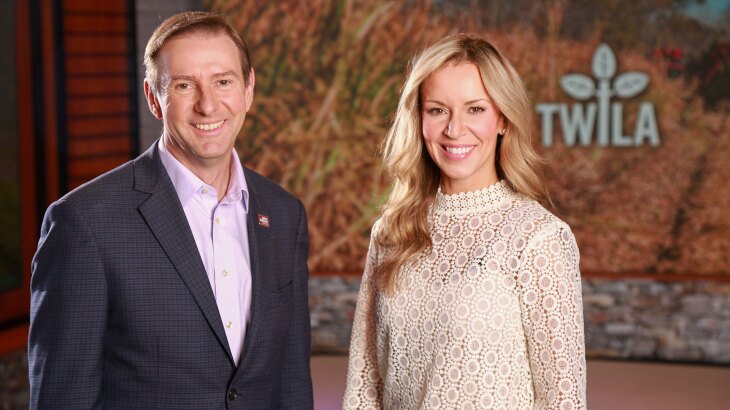Urban forests are more than a collection of trees. To those who maintain them, they also embody a unique mindset and a thoughtful perspective viewing urban spaces as integral parts of larger forests and regional ecosystems.
This is the philosophy guiding the team of arborists at the University of Kentucky, a dedicated group of professionals committed to shaping the campus environment beyond the confines of buildings and classrooms. For the team of UK arborists and the many who appreciate and utilize the green space, the urban forest surrounding the University is an essential element of the campus experience rather than a mere backdrop.
The trio of full-time campus arborists wears multiple hats in their endeavor to nurture the University’s urban forest. From pruning to planting and removals, they play a crucial role in maintaining the health and vitality of the campus greenery.
One notable aspect of their work involves injecting pesticides into trees, a preventive measure against the emerald ash borer. This showcases their dedication to preserving the campus’s verdant landscape.
Reflecting on his time as a UK student, one arborist recalls the many ideas that flourished in him as he sat, inspired, beneath the canopy of a tree in the same spaces he tends today. In his view, the urban forest is a living, breathing extension of the campus and vital to the student experience.
One of the arborists’ frequently asked questions is about tree removal. While they express a reluctance to take down trees, the campus community’s safety remains a paramount concern. With a keen awareness of the impact of each cut on the tree canopy, the team carefully evaluates whether removal is necessary, particularly in high-traffic areas where safety is a primary consideration.
Payment totals alone do not show financial stress — production costs and net losses complete the picture.
January 26, 2026 02:30 PM
·
Without additional support, many soybean operations will continue to face financial stress as they prepare for the 2026 crop.
January 26, 2026 09:41 AM
·
USDA Rural Development Director for Kentucky, Travis Burton, joined us to discuss the Princeton facility (formerly Porter Road Meats), now backed by the USDA, and its role in expanding domestic meat processing capacity.
January 23, 2026 03:39 PM
·
Farm CPA Paul Neiffer joined us to break down the recent Fifth Circuit Court decision overturning a prior Tax Court decision on self-employment tax for limited partners, the ruling’s impact on farmers, and potential next steps in Congress.
January 23, 2026 02:00 PM
·
Mike Steenhoek with the Soy Transportation Coalition discusses supply chain challenges facing agriculture as snow, sleet and ice threaten most of the Eastern U.S.
January 23, 2026 01:36 PM
·
Brian Earnest, an animal protein economist with CoBank, shares insights into current demand trends and the challenges facing broiler production.
January 22, 2026 06:34 PM
·
University of Nebraska President Dr. Jeffrey Gold joined us to discuss seasonal affective disorder, winter mental health, and practical strategies for maintaining well-being in rural communities.
January 21, 2026 01:26 PM
·
The Farm Bureau is making an urgent call to Congress for more farm support. Colton Lacina with Farmers National Company joined us to discuss farmland values and how market dynamics for the year ahead reflect stabilization rather than collapse.
January 21, 2026 12:30 PM
·
Congressional leaders signal momentum toward expanded, targeted farm aid to help producers manage losses and cash-flow stress in 2026.
January 20, 2026 11:48 AM
·




















